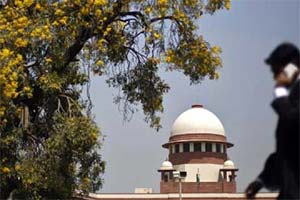In a landmark judgement upholding freedom of expression, the Supreme Court today struck down a provision (Section 66A) in the cyber law which provides power to arrest a person for posting allegedly “offensive” content on websites.
Terming liberty of thought and expression as “cardinal”, a bench of justices J Chelameswar and R F Nariman said, “The public’s right to know is directly affected by section 66A of the Information Technology Act.”
Justice Nariman, who pronounced the online free speech verdict in a packed court room, also said that the provision “clearly affects” the fundamental right to freedom of speech and expression enshrined under the Constitution.
I’m feeling very happy, we have got justice after 2 years: Rinu Srinivasan (Palghar girl) #Sec66A pic.twitter.com/6QoaCXVrSu
— ANI (@ANI_news) March 24, 2015
Elaborating the grounds for holding the provision as “unconstitutional”, it said terms like “annoying”, “inconvenient” and “grossly offensive”, used in the provision are vague as it is difficult for the law enforcement agency and the offender to know the ingredients of the offence.
(Read Also: Section 66A of IT Act: Bollywood hails Supreme Court judgement)
The bench also referred to two judgements of separate UK courts which reached different conclusions as to whether the material in question was offensive or grossly offensive.
I am very happy and grateful to SC: Youth who was arrested for making anti Azam Khan comment on social media pic.twitter.com/0uDZEbrItF
— ANI (@ANI_news) March 24, 2015
“When judicially trained minds can reach on different conclusions” while going through the same content, then how is it possible for law enforcement agency and others to decide as to what is offensive and what is grossly offensive, the bench said, adding, “What may be offensive to a person may not be offensive to the other”.
The bench also rejected the assurance given by NDA government during the hearing that certain procedures may be laid down to ensure that the law in question is not abused.
We’re very happy,consequences are going to be very positive: Manali Singhal(Mother of Shreya Singhal, Lawyer) #Sec66A pic.twitter.com/WMrq0aQZps
— ANI (@ANI_news) March 24, 2015
The bench, however, did not strike down two other provisions- sections 69A and 79 of the IT Act- and said that they can remain enforced with certain restrictions.
SC has upheld citizens’ right of freedom of speech & expression: Shreya Singhal, Petitioner #Sec66A pic.twitter.com/dMqN6ChtNw
— ANI (@ANI_news) March 24, 2015
Section 69A provides power to issue directions to block public access of any information through any computer resource and 79 provides for exemption from liability of intermediary in certain cases.
The apex court pronounced its verdict on a batch of petitions challenging constitutional validity of certain sections of the cyber law.
It’s a very good judgment, it has sent across a very good message: Kamini Jaiswal, Senior Lawyer #Sec66A pic.twitter.com/VJHY7L0w1n
— ANI (@ANI_news) March 24, 2015
In the wake of numerous complaints of harassment and arrests, the apex court had on May 16, 2013, come out with an advisory that a person, accused of posting objectionable comments on social networking sites, cannot be arrested without police getting permission from senior officers like IG or DCP.
SC made appropriate decision, #Sec66A was antithesis of freedom of speech and expression: Manish Tewari, Cong pic.twitter.com/WGPcrubN2q
— ANI (@ANI_news) March 24, 2015
After the apex court had reserved its judgement in the matter on February 26 this year, another controversial case hogged the limelight for alleged misuse of section 66A, in which a boy was arrested on March 18 for allegedly posting on Facebook objectionable comments against senior Samajwadi Party leader Azam Khan.
A petition was filed before the Supreme Court in this regard alleging that its advisory was violated after which the apex court had asked UP police to explain the circumstances leading to the arrest of the boy.
